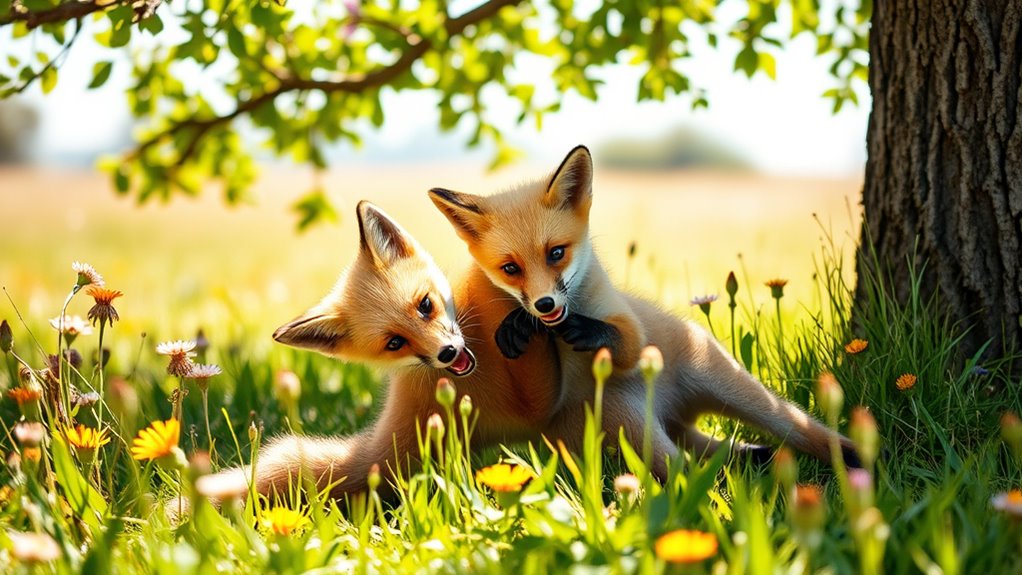Play behavior in mammals is crucial for their growth and development. It helps you build important social skills and emotional resilience while also boosting your cognitive abilities. By engaging in play, you’ll enhance problem-solving skills and learn to navigate complex environments. Plus, those play interactions shape relationships and establish social hierarchies, which are essential for survival. Understanding the depth of play’s significance reveals even more layers of its importance in the animal kingdom.
Key Takeaways
- Play is crucial for mammalian growth, fostering essential life skills beyond mere entertainment.
- Engaging in play helps young mammals build social bonds and understand hierarchies within their groups.
- Play stimulates cognitive development, enhancing problem-solving abilities and creative thinking through challenges.
- Emotional well-being is supported by play, providing stress relief and fostering resilience among mammals.
- Overall, play equips mammals with skills necessary for survival and successful navigation of complex environments.

When you observe mammals in their natural habitats, you might notice that play isn’t just a whimsical activity; it’s an essential part of their development. Whether it’s puppies tumbling over each other or young elephants chasing after one another, play serves fundamental functions that extend far beyond mere amusement. Engaging in play allows mammals to hone indispensable life skills, and you can see this firsthand as they navigate their environments.
Play is a vital aspect of mammalian development, honing essential life skills beyond mere amusement.
One of the most significant benefits of play is social bonding. Young mammals often engage in playful interactions with their peers, and this helps them build relationships that are foundational for their survival. You might see a group of lion cubs frolicking together, practicing their hunting skills while also learning to cooperate. These playful encounters not only strengthen their social ties but also establish a hierarchy that’s important for adult dynamics. By playing together, they learn to communicate, understand body language, and negotiate social situations, which are essential skills as they mature.
Cognitive development is another key aspect of play that you can’t overlook. When young mammals engage in play, they’re not just having fun; they’re also stimulating their brains. Through playful exploration, they encounter new challenges that require problem-solving. For example, you might observe a young otter juggling rocks or using tools to access food. This kind of play enhances their cognitive skills, allowing them to think creatively and adaptively in real-world situations. The more they play, the more they learn about their environment, which ultimately prepares them for the complexities of adult life.
As you watch these animals at play, it becomes clear that this behavior is necessary for their emotional and psychological well-being, too. Play provides an outlet for energy and stress relief, helping mammals to develop resilience. The bonds formed during these playful interactions create a support network that can be invaluable during challenging times. Additionally, engaging in play behavior can enhance social bonding skills that are critical for successful interactions in their future.
In essence, play isn’t just a pastime for mammals; it’s a fundamental part of their growth. By engaging in social bonding and cognitive development through play, they equip themselves with the skills necessary to navigate their world successfully. So the next time you see mammals frolicking, remember that what looks like fun is actually a critical stepping stone toward their future.
Frequently Asked Questions
How Does Play Behavior Vary Between Species of Mammals?
Play behavior varies considerably between mammal species. For instance, you’ll notice that young dogs often exhibit a rough-and-tumble play style, while primates might engage in more social, complex interactions. The play duration also differs; some species, like dolphins, can play for extended periods, while others, like certain rodents, may have shorter bouts. Observing these differences can give you insights into their social structures and developmental needs.
What Are the Evolutionary Benefits of Play in Mammals?
Did you know that mammals that engage in play have a 30% greater chance of developing complex problem-solving skills? Play’s evolutionary benefits include enhancing cognitive development, as it helps young animals learn crucial survival skills. Play deprivation can stunt this growth, leading to poorer social interactions and adaptability. By exploring their environment through play, mammals build the mental agility needed to thrive in their ever-changing habitats. It’s essential for their overall development!
Can Play Behavior Influence Social Structures in Mammal Groups?
Yes, play behavior can notably influence social structures in mammal groups. Through engaging in activities like play aggression, you help establish dominance hierarchies and social roles. These interactions foster social bonding among individuals, strengthening group cohesion. When you play with others, you create alliances and improve communication, essential for survival. Ultimately, play shapes the dynamics of your social group, promoting cooperation and reducing conflicts, which benefits everyone involved.
How Do Environmental Factors Affect Play Behavior in Mammals?
Sure, let’s imagine a world where squirrels don’t play because their habitat’s too cramped. You wouldn’t want to frolic in a tiny box, would you? Environmental factors hugely impact play behavior. In spacious habitats, mammals thrive and engage in fun, but when resources are scarce, they prioritize survival over playtime. So, if food’s limited, don’t expect playful antics; those critters are too busy rationing their nuts instead of chasing each other around!
Are There Any Risks Associated With Play Behavior in Mammals?
Yes, there are risks associated with play behavior in mammals. While play is essential for development, it can lead to play injuries, especially in younger animals. You might notice that roughhousing can sometimes escalate, resulting in behavioral risks like aggression or fear. Monitoring play interactions helps you guarantee safety, preventing injuries while still allowing for healthy socialization and skill development. Balancing the freedom to play with caution is key for their well-being.
Conclusion
In conclusion, play behavior in mammals isn’t just fun—it’s essential for development and survival. Did you know that nearly 90% of juvenile mammals engage in play? This playful activity helps them hone their skills, build social bonds, and learn critical survival tactics. So next time you see animals frolicking, remember that their playtime is serious business, shaping their future and ensuring a healthier, more adaptable species. Embrace the importance of play in the animal kingdom!









